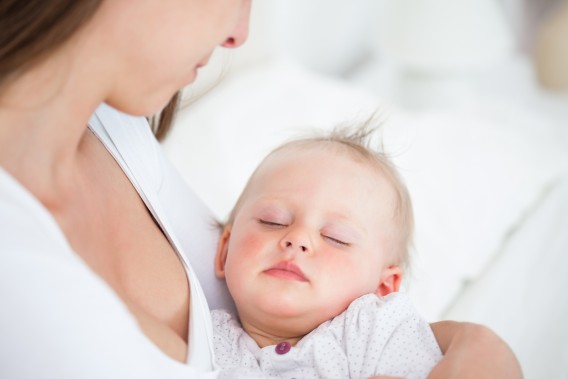
Gastroenteritis is usually caused by a virus, the most common of which is rotavirus. Most children in the UK under the age of five will get rotavirus but once you’ve had it, you usually become immune to it, although unfortunately there are lots of other bugs that can make your child sick. Some children are ill for 24 hours and make a speedy recovery, or in more serious cases, the illness can last for a few days. Although it’s unpleasant for your baby and upsetting for you as a parent, it’s not usually serious, and the biggest risk to your child’s health is that they become dehydrated. Breastfed babies are less prone to tummy bugs than those who are formula-fed because of the risk of bacteria developing on bottles and teats that haven’t been cleaned properly.
If your baby is vomiting and has a fever, seek medical advice quickly. This could suggest an underlying infection or meningitis.
If the vomiting or diarrhoea goes on for more than a day, then your baby may be at risk of dehydration.
This might be the case if she:
If you notice any of these symptoms, see your doctor quickly so you can get your baby assessed and treated.
Vomiting and diarrhoea bugs are easily spread – make sure you wash your hands frequently and wash all clothes and bedding at 60 degrees.
Keep toilets clean and wash towels frequently (at least 60 degrees).
If you bottle feed your baby, make sure all equipment is properly sterilised. Boil submerged in water for at least 10 minutes if you don’t have a steam steriliser.
Keep your baby away from nursery and baby activities for 48 hours after recovery and don’t take your baby into a swimming pool for two weeks after the last bout of diarrhoea.
It’s particularly important if your baby is vomiting and has a fever that you seek medical advice quickly. This could suggest an underlying ear, chest or urinary infection or, in severe cases, meningitis.
Offer your baby frequent breastfeeds or bottle feeds. Diarrhoea is actually easier to combat because you can continue to give your baby fluids to drink.
If your doctor recommends it, you can buy oral rehydration fluids or salts which help replace all the electrolytes lost during vomiting and diarrhoea. These are available from your local pharmacy or on prescription. Only do this under the advice of your doctor.
For a list of useful contact details for The Portland Hospital, please click HERE.
